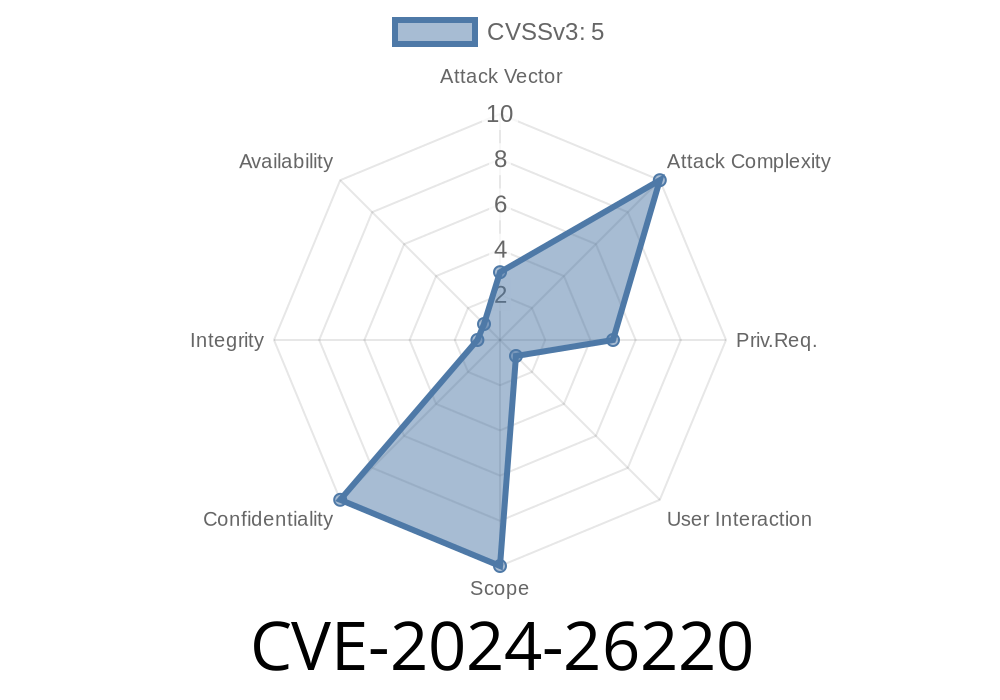In February 2024, Microsoft patched a significant vulnerability identified as CVE-2024-26220 in Windows — specifically affecting Windows’ Mobile Hotspot feature. In this post, let’s dive into what this vulnerability is, why it's dangerous, how it can be exploited, and what steps you can take to stay safe. We’ll use simple language and clear code snippets to help you fully understand the risk, whether you’re a sysadmin, power user, or simply concerned about your privacy.
What is CVE-2024-26220?
CVE-2024-26220 is an *information disclosure* vulnerability in the Windows Mobile Hotspot service. When you enable Mobile Hotspot on your Windows device (laptop/tablet), it lets other devices connect to the Internet through your Wi-Fi. But due to this flaw, an attacker on your wireless network could potentially grab sensitive network information — including the real IP address, possibly even exposing the connected device list and network configuration details.
Reference
- Microsoft Security Update Guide: CVE-2024-26220
How Does the Vulnerability Work?
The vulnerability exists because Windows Hotspot broadcasts extra information in response to certain crafted requests. While this info is meant for the system, it's sent in plaintext over the local network. A nearby attacker, who’s also connected to the hotspot or in the Wi-Fi range, could intercept these details using simple sniffing tools.
Example: Imagine you’re in a coffee shop, sharing your laptop’s internet via Mobile Hotspot. A hacker connects to your Hotspot (or possibly probes it wirelessly) and captures the data that Windows sends out, leaking network configuration data without your knowledge.
What You Need
- A computer running Windows 10/11 with Mobile Hotspot enabled (as the *victim*)
Attacker sniffs hotspot traffic using Wireshark
`bash
# Linux/MacOS with Wi-Fi packet capture
Or use Npcap on another Windows machine.
3. Identify DHCP/MDNS/UPnP traffic. The attacker looks for unencrypted response packets from the Mobile Hotspot host. Windows Hotspot, before patch, could respond to various queries with sensitive internal data.
Example Wireshark Filter
udp.port == 5353 || udp.port == 67 || udp.port == 68
This filter lets the attacker isolate multicast DNS and DHCP traffic, which often carry sensitive info.
Example Data Seen (Sanitized)
Source: 192.168.137.1
Protocol: DHCP
Host Name: JohnLaptop
DNS Server: 192.168.137.1
Domain Name: mshome.net
Or via Multicast DNS (mDNS)
Device Service Name: JohnLaptop._workstation._tcp.local
This gives away the internal hostnames and network structure, which should normally be hidden!
Privacy Breach: Attackers can learn more about your device and which devices are connected.
- Targeted Attacks: With hostnames/IPs, attackers can attempt further exploits or fingerprint vulnerable devices.
Patch Status and Workaround
Microsoft has patched this flaw in the February 2024 Patch Tuesday. Ensure your system is updated!
- Official patch: Microsoft CVE-2024-26220 advisory
- Update your Windows: Go to Settings → Update & Security → Windows Update → Check for updates.
Final Thoughts
CVE-2024-26220 is a textbook example of how even common, well-intentioned features like Mobile Hotspot can leak unexpected details. Keeping your system updated is the best defense, but being aware of the tactics attackers use helps you better protect yourself and your organization.
References
- Microsoft Security Update Guide: CVE-2024-26220
- Microsoft Patch Tuesday – February 2024 overview
- Wireshark – Official Download & Docs
Timeline
Published on: 04/09/2024 17:15:41 UTC
Last modified on: 04/10/2024 13:24:00 UTC
